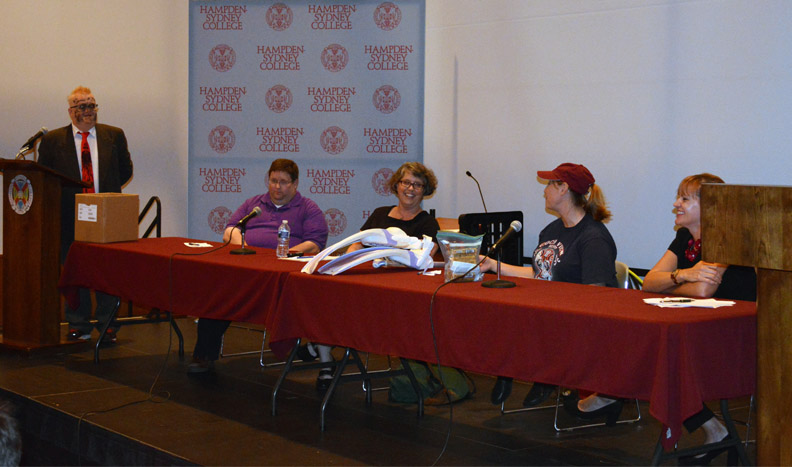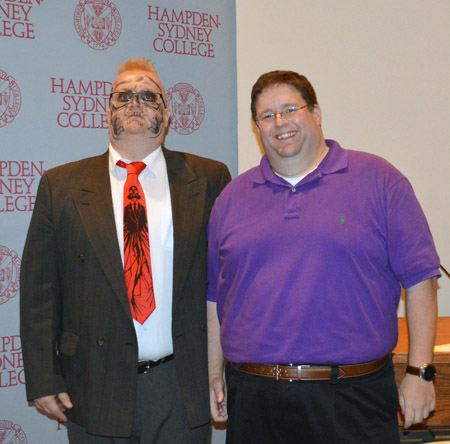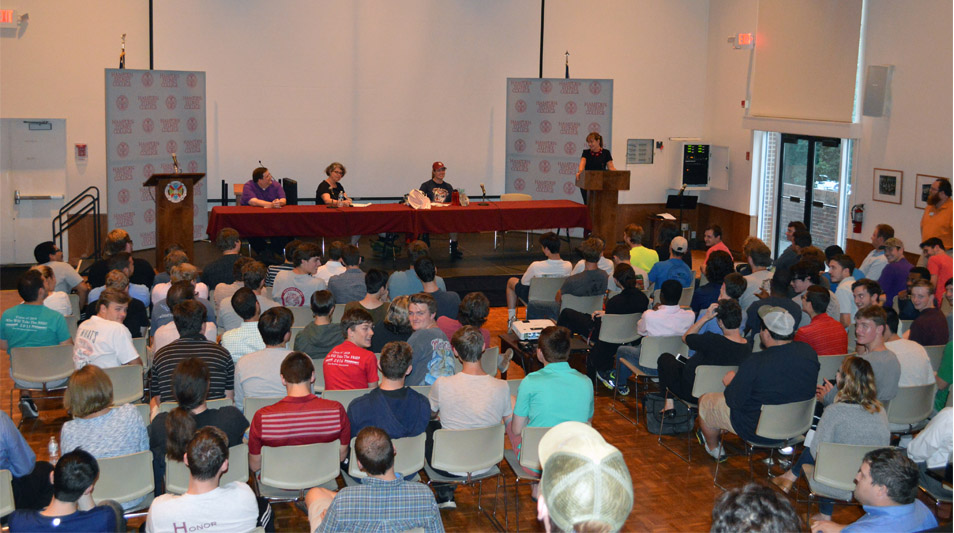by Aaron Kurz '18
Recently, this campus witnessed the most highly anticipated face-off of the new academic year. As the contenders took the stage and photographers assumed their positions, what was once a large room seemed to shrink into a fiercely intimate arena.

Then, as the annual Raft Debate was thrust into action by a war-painted Dr. James Frusetta, the post-apocalyptic future of education was suddenly at stake.
The Raft Debate takes place at the beginning of each year. Professors from a variety of disciplines take the stage to argue for their specific skills-as chemists, economists, or linguists, to name a few-to fill the final seat on a life raft. What makes the debate more interesting, is that the audience members are already on the raft, and the professors are at the mercy of countless students and faculty that get to decide who joins them.
With one seat left on the raft leaving the Hill and bound for a new start, the debate began. Dr. Geoffrey Lea pled the case for the economics department, while Dr. Julia Palmer represented the humanities. Fully equipped with scuba gear was Dr. Kristin Fischer from the biology department. And, finally, arguing for hot wings and rum to fill the last seat was Associate Dean of Faculty Dr. Jennifer Vitale.
Dr. Lea began the debate by applying economic thinking to the task at hand. In rebuilding society, Lea reminded us of opportunity cost: every decision we make has a certain foregone value. By this token, it is useful to be practical in deciding which professor joins the raft. Since professors aren't generally good with farming or scavenging-and with an array of Eagle Scouts, hunters, and other student outdoorsmen in the audience-he argued the economic understanding of choices and consequences would be the best addition to the raft.

Following economics was the humanities. Humanities encompasses a unique understanding of critical thinking through understanding of human nature, which Dr. Palmer was quick to mention as a personal skill. Sandwiched between an economics professor and a biology professor, Dr. Palmer's slide show presentation was quite direct in its argument for the merits of the humanities: articulation of human nature, linguistic fluency, and even the fact that textbooks aren't as expensive as math and science textbooks. Audience participation remained high as Palmer reminded us, "he who gets run over by a truck gets run over by math and science."
Perhaps the most enthusiastic testimony of personal eligibility for the raft came from Dr. Fischer in her defense of biology. Dr. Fischer cited her experience in veterinary medicine, as animal husbandry and basic first aid are two crucial skills in rebuilding civilization. Dr. Fischer was prepared to speak on not only biology's behalf, but that of all science, as she also surrounded herself on stage with scuba gear, a first aid kit, and a fresh water supply. The rambunctious group of science majors in the audience responded with particular enthusiasm to her claim that she also homebrews, with Dr. Deifel's exclamation, "Beer is science!" joining their cheers.
The final speaker, Dean Vitale, took the most unorthodox position, antagonizing each of her opponents by arguing that the final seat be designated for hot wings and rum. There was evidently a strong fan base for this idea, as the audience erupted into applause following each of her comments. Perhaps the biggest response came after Dean Vitale's ruthless question to Dr. Lea: "Do we really give a handout to the economics professor who didn't buy his own boat?"
After a brief but intense round of questioning from the audience, Dr. Frusetta's decibel reader declared Dr. Lea the winner based on volume of applause-a surprise given Dean Vitale's appeal to the audience's indulgent side.
As the annual Raft Debate came to an end, the previously dismal outlook on a post-apocalyptic world gained a new sense of promise. After all, if a Hampden-Sydney professor blazes the trail of new-world education, then humanity is in surprisingly good shape.
